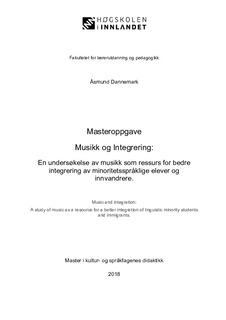Musikk og Integrering: En undersøkelse av musikk som ressurs for bedre integrering av minoritetsspråklige elever og innvandrere.
Abstract
Norsk:
"Musikk og Integrering: En undersøkelse av musikk som ressurs for bedre integrering av minoritetsspråklige elever og innvandrere", er en masteroppgave som undersøker om musikk kan være en verdifull integreringsressurs, og hvilke konsekvenser dette kan ha fra samfunnspolitiske, økonomiske og etiske perspektiver. Oppgavens problemstilling er:
«Hvordan kan musikk være en ressurs for en bedre integrering av minoritetsspråklige elever og innvandrere?»
Oppgaven benytter seg av litteraturstudie og narrativ dokumentasjon (brevmetoden) som metoder for å besvare oppgavens problemstilling, hvor oppgavens konklusjon og drøfting er grunnfestet i både teoribaserte forskningsfunn og subjektive erfaringer som empiri.
Oppgaven tar utgangspunkt i tre påstander som fungerer som ankerpunkt gjennom oppgavens litteraturstudie. Disse påstandene er:
1. Integrering er godt og nødvendig for både innvandrere som individ og for samfunnet innvandrerne flytter til.
2. Integrering er vanskelig og det er mange utfordringer knyttet til integreringsarbeid.
3. Musikk skaper tilhørighet og kan bygge relasjoner mellom mennesker med tilsynelatende lite til felles.
Funnene i denne oppgaven peker på musikk som en svært effektiv og verdifull integreringsressurs fra et etisk, samfunnspolitisk og samfunnsøkonomisk perspektiv i tillegg til oppgavens perspektiv på integreringsdefinisjoner. Sentrale temaer i oppgaven er: Samfunnsøkonomiske konsekvenser av vellykket eller mislykket integrering, forholdet mellom språkopplæring, arbeidsliv og musikkpedagogisk arbeid, sammenhengen mellom nasjonal, sosial samt individuell identitet og musikk og musikkens evne til å inkludere, skape tilhørighet og bygge fellesskap.
Nøkkelbegreper: Musikk, inkludering, integrering, akkulturasjon, mangfold, språkopplæring, samfunnsøkonomi, musikkfenomenologi, musikketnografi English:
“Music and Integration: A study of music as a resource for a better integration of linguistic minority students and immigrants”, is a master thesis which examines whether music can be used as a valuable resource for integration what consequences this can have from social, economic or ethical perspectives. The main research question for the thesis is:
«How can music be a resource for a better integration of linguistic minority students and immigrants?»
The thesis makes use of literature review and narrative documentation (letter method) as research methods for answering the question, where the conclusion and discussion of the thesis is based on both theory-based research findings and subjective experiences as empirical evidence.
The text is based around three statements which act as anchor points throughout the literature study. These statements are:
1. Integration is valuable and necessary for both the immigrants as individuals as well
as the society to which they move.
2. Integration is difficult, and there are many challenges connected to integration work.
3. Music creates a sense of belonging and can build relationships between people whom appears to have little in common.
The findings in this thesis points towards music as being a very effective and valuable resource for integration from an ethical, social and socioeconomic perspective, in addition to the perspective of presented definitions on integration. Key topics in the assignment are; socioeconomic consequences of successful or failed integration, the relationship between language learning, employment and music education, the connection between music and national, social and individual identity and music's ability to include, build community and a sense of belonging.
Keywords are: Music, inclusion, integration, diversity, acculturation, language learning, socioeconomics, musical phenomenology, ethnomusicology
Description
Mastergradsoppgave i kultur- og språkfagenes didaktikk, Høgskolen i Innlandet, 2018.
